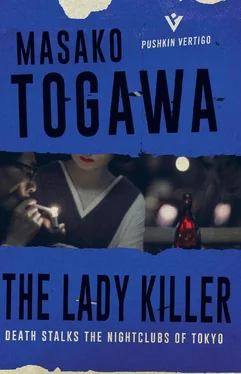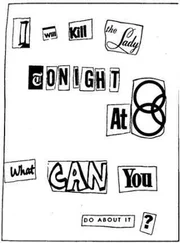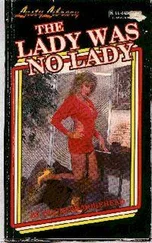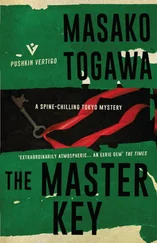The day before Mitsuko Kosugi was killed… but could there be any connection? Surely not. Feeling disappointed, Shinji poured himself a mug of green tea to take the taste of sushi out of his mouth. He prepared to leave, but the salesman began to speak again.
“Look, as I’ve told you, I’ll give the money back. And to make amends, I’ll give her some of the new cream I’ve got that covers up spots, freckles, and even moles. It contains ingredients imported from France and is rather expensive, but I will give her a jar for nothing.”
Shinji listened in stunned silence.
“You know, that mole she has on the side of her nose.”
Shinji absently picked up a small pebble that was lying on the counter and hurled it somewhere without particularly caring. It struck something, rattling hollowly.
“Yes, she was concealing it behind a handkerchief, you know, but of course that attracts more attention than if you are open about it. A mole isn’t such a defect that you have to hide it; indeed, if displayed openly, it has a charm of its own. But this new makeup will take care of it.” Sada chatted on, but Shinji sensed behind the self-confident charm of the salesman a deep concern about the money and the jewelry.
“What will happen as a result of all this?” Sada asked.
“Depending on how it turns out, you may have to give evidence in court. However, I don’t think there’s any way you will get into trouble over this. For the time being, hang on to the money.”
“Court? Do you mean a divorce court?”
“Something like that.” He got up to leave and made as if to pay, but Sada restrained him, laying an oily hand, sticky with sweat, on his wrist. Shinji allowed him to pay, thanked him and left.
He set off on foot for Asagaya Station. What did it all mean? How could he organize the jumble of facts into a coherent picture? Everything seemed so disconnected. In the damp heat of the evening, he couldn’t think straight. If only Hatanaka was with him; the old man would soon put the pieces of the jigsaw together.
After all, he thought, he was just a reporter collecting facts and incidents for his master. He could almost see the old lawyer’s heavy-lidded face, smell his fragrant cigar.
He reached Asagaya Station and bought a ticket to Shinjuku. Now for the last name on his list. He must go and talk to a boy in a homosexual bar.
He felt like going home to sleep instead but overcame the urge, as does a gambler who is determined to stay up all night.
6
The distance from Shinjuku Station to Hanazono-cho, which was where the gay bar was located, was quite far on foot. As Shinji headed in that direction, the majority of people were coming the other way. He collided with a hostess who was obviously in a rush to catch the last train, and she cursed him raucously.
Finally he came to Toden Avenue; crossing this broad thoroughfare and making his way toward the Hanazono Shrine, he finally came upon a maze of streets laid out like a gridiron behind the shrine, formerly an area licensed for prostitution. Turning into a narrow alleyway at the second intersection, he found himself in a jungle of tiny bars, each of them with a frontage no more than a few feet wide, and each advertising itself with a similar neon sign. There were also paper lanterns and painted boards; which, amongst these myriad establishments, could be his destination?
It was late, and the street was deserted. No voices of drunkards singing arose to assail his ears, as he might have expected. No heavily made-up woman tried to tug him into a doorway, as might normally be expected in such an area. He poked his head into a tiny bar occupied by a middle-aged woman in an apron and asked her how he could find his destination.
“I’ve no idea,” she said. “Give up and have a drink here instead. I’ll introduce you to a nice girl.” She sat warming her feet over a charcoal brazier, which seemed to double as an ashtray, so full was it of cigarette ends and broken chopsticks. He declined her offer and made his escape; after a few moments he looked back, but there was no sign of her following him. It seemed that she was resigned to her lot and no longer hustled for business.
Only one place showed any sign of life: a tiny restaurant that had obviously once been a bar. From it wafted delicious smells of fish on the grill and fermented bean soup. Shinji suddenly realized that he had hardly eaten that night and went in. Five customers would fill it; there were three—a waiter off-duty, identifiable by his bow tie, and two tarts. They looked up as he entered but betrayed no interest, soon returning to their chopsticks and their bowls.
Behind the counter, an honest-looking couple in their early fifties were working diligently; he took them to be husband and wife. He glanced at the menu and ordered a bowl of rice and salmon doused in hot tea. While it was being prepared, he smoked a cigarette and reflected. The faces of the four men that he had interviewed floated before his eyes. The medical intern, the day laborer, the salaryman at the film laboratory, the salesman of cosmetics… each face rose before him in turn.
Of these four, two had nothing to tell him that he could see was of any significance. The other two had both spoken of the strange woman. And none of them had recently given blood. Did that mean that they had no connection with blood? If so, why had the person who had spoken to the blood banks on the telephone been so interested in AB Rh-negative? Surely he or she wanted to obtain some? Shinji was totally confused.
The cook brought his food, and he savored the perfumes of seaweed and sesame seed.
Just one more to go , he thought as he ate. The boy in the gay bar; was he the last stud card? Had he been turning up the wrong cards so far? It was almost like playing poker, he decided.
He ate the last mouthful and found it full of horseradish, which almost choked him. He gulped down some tea hurriedly and then asked the master the way to Bar B.
“It’s right here—one floor up.” The neon sign with the big letter B was under the eaves, he now realized, and he had not noticed it. He paid his bill, went out and began to climb the narrow staircase, which was so steep and contorted that he nearly fell halfway up. But upstairs turned out to be more spacious than he had expected; the room was occupied by four or five customers, all of them looking like pederasts. He flopped into a bar stool and hunched his shoulders. A boy with softly waved curls down his forehead came up to him.
“What can I get you, sir?”
“Beer,” said Shinji.
“Yes, sir, of course, sir, please wait a moment,” said the boy coquettishly and minced away.
Behind the counter were three other young men, all dressed identically in shirts with broad vertical stripes and narrow ties. They leaned on the counter flirting with the customers, occasionally stepping back and shaking their bodies sensuously in time to the music. They all wore tight jeans that were sculpted over their bottoms. And which of them could be Nobuya Mikami? Shinji had no idea, for although the detective agency had provided photographs of the other four men, they had omitted to do so in this case. Either the researcher was embarrassed to ask the precious young man for a photograph, or else he had presumed that Shinji would make contact by phone rather than visit the bar.
Perhaps it had been a mistake to come here, Shinji reflected as he sipped his beer; certainly his motives would be misunderstood. He put a cigarette in his mouth, and immediately the boy who had served him produced a light. There was a golden initial A embroidered on his tie.
“My name is Akiko,” said the boy, pointing to the A on his tie. “How do you do?”
So they all had their initials on their ties, thought Shinji, and indeed it was so. Each boy had an initial on his tie, but none of them sported an N. Nobuya Mikami must be out with a customer. If he waited, would he be back?
Читать дальше












